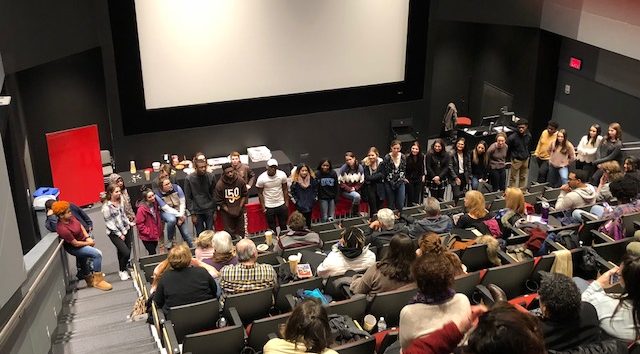I was lucky enough to have already shot and cut an interview for another class earlier in the year, which gave me a bit of a leg up while doing this interview. It was tough for me to choose another subject however, because I feel like I put so much thought into my previous one that I would never get a subject that I was as passionate about. You don’t always have to be extremely passionate about your subject to begin with, however. I learned a lot about my interview subject, Daniel Gonzalez, when I shot his interview, which made me more and more passionate as the project as it went on. I had known Daniel previously, he is a fellow employee at Skillman library with me. I thought I knew a lot about him, but it turns out I knew a lot about his life here at Lafayette, but I knew nothing about his life prior. I think I really tried to tell Daniel’s story through the lens of a student who is part international and part domestic. I think this was what made Daniel an interesting interview subject; he doesn’t fit a specific mold.
I’ve noticed a few key tips when actually shooting interviews that make them successful:
- Make sure you have good audio (use a wireless lav mic)
- Utilize the rule of thirds when interviewing your subject
- Make sure your subject is not looking right at the camera (position yourself off-camera so that he/she looks at you and makes the interview look real ad effective)
- Ask the right questions (prepare them beforehand, and make sure they require lengthy answers)
- Make sure your subject rewords the questions
The thing I still struggle with in terms of interviews is b-roll. It is extremely difficult to get b-roll of a subject from their past without recreating it, which is difficult in itself. Also, when your interview theme is very specific, it is difficult to get b-roll that is specific to your subject. Time is always of the essence with b-roll. There is always a deadline looming and that means you have to ask your subject to take more time out of their day to dedicate to your project. B-roll is something I will have to work on with future interviews, for sure.

I think the tips you provide are so true. The last few tips are ones I used in my interview and I think they definitely made the project a little easier in the editing room (especially having the subject reword the question in their answers). I didn’t think to use a wireless lab mic and my audio wasn’t good, so I’ll have to remember that for next time.
Those tips you outlined are awesome. I definitely used some in my interview but left several out, which would’ve improved my interview in my opinion. One think I didn’t do but really regretted was not having my interview subject reword the question. I think that thought had crossed my mind but I didn’t dwell on it or think how it would affect my editing. My only concern is if it is awkward to ask them to reword the question in their response. Not so much if it is awkward but if it makes their response in-genuine. It might not but that was my only concern going into the interview and asking them to rephrase their answer.